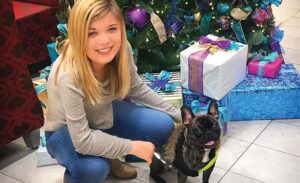The summer before going to college, Ali Hooks began noticing something was wrong. After her move from Opelousas to Lubbock to attend Texas Tech, she sought medical help for the first time in her young, healthy life.
“I saw a couple doctors and none of them could really diagnose me with what was happening,” says Ali, now 20. As a first-generation college student, Ali was told she was experiencing anxiety and nerves, and later, doctors thought she had a stomach ulcer. But she continued to feel worse, and on October 5, 2018, she walked into the emergency room unable to breathe. Further testing revealed end-stage renal disease, and Ali was immediately rushed into an emergency surgery.
Ali’s mother, Misti Hyatt, was beside herself at the news, as her mother had suffered and died from the same condition. Ali’s small town’s network activated, and her favorite high school teacher’s sister, who lives in Lubbock, came to the hospital to be sure Ali wasn’t alone until her parents could arrive.
Ali endured another risky surgery on her heart while she was being stabilized over the next weeks, and she settled into a routine of regular dialysis, which took up much of her time, up to five days a week and five hours per session. Ali experienced another terrifying incident when she had a light stroke and a seizure.
“Despite the medical journey, I did dialysis and had my good days and bad days,” Ali says. “My bad days involved just sickness and being too weak to go to class.” April brought pneumonia and a couple weeks in the hospital, after which Ali decided to go stay with her mom in Dallas while she waited for a kidney trans-plant. “No one in my family was a match.”
On her way back to Lubbock to begin the fall semester, Ali got a shocking call. Her mom’s childhood best friend, Bambi Polotzola, was a match, and she was willing to donate a kidney. “I was hysterical, crying on the side of the road and so many emotions,” Ali says.
Further testing revealed that Bambi and Ali were a 100 percent match. “That rarely ever happens in kidney patients,” Ali says. “She has the exact same kidney as I did. She was basically made to help me.”
The transplant surgery took place on December 23 in Dallas. Bambi, who is the director of Disability Affairs for Governor John Bel Edwards, and Ali were able to spend time together. “I basically just hugged her and broke down crying, saying thank you for saving my life,” Ali says. “She was like, ‘Don’t mention it.’ She was so calm.”
The transplant has been a success, although adjusting to the transplant life has been challenging. “It’s not as easy as everyone assumes,” Ali says. She takes many medications, and managing the side effects takes a toll. She’s been diagnosed with medical PTSD and is receiving help to work through anxiety and depression.
“Now I’m just focusing on my studies and trying to get back to normal,” Ali says. Her emotional support dog, a French bulldog named Chester James whom she adopted early in her medical journey, is a big help.
As a criminology and forensic science major, Ali is considering her future. “I want to do something that could help other people because I was given a second chance at life. I want to pay that forward and try to help someone else in the future.”





